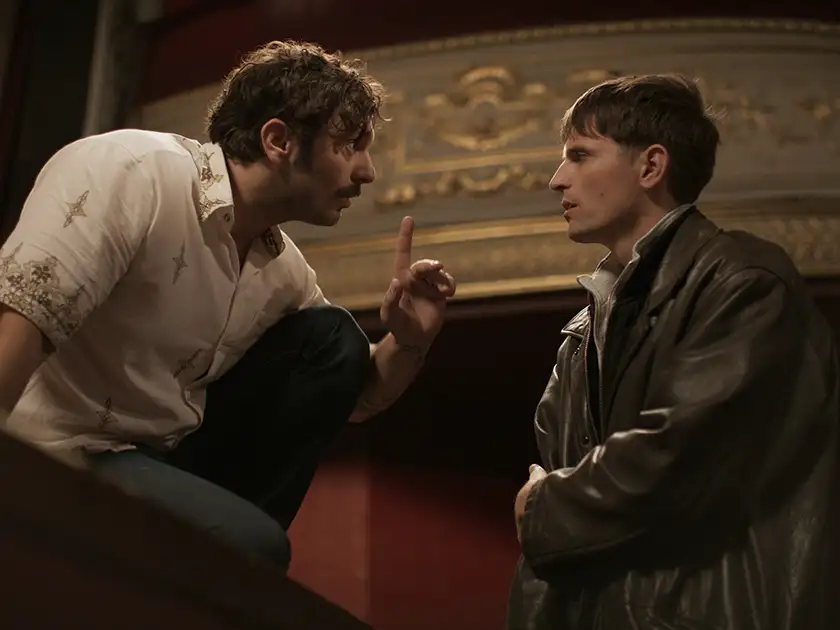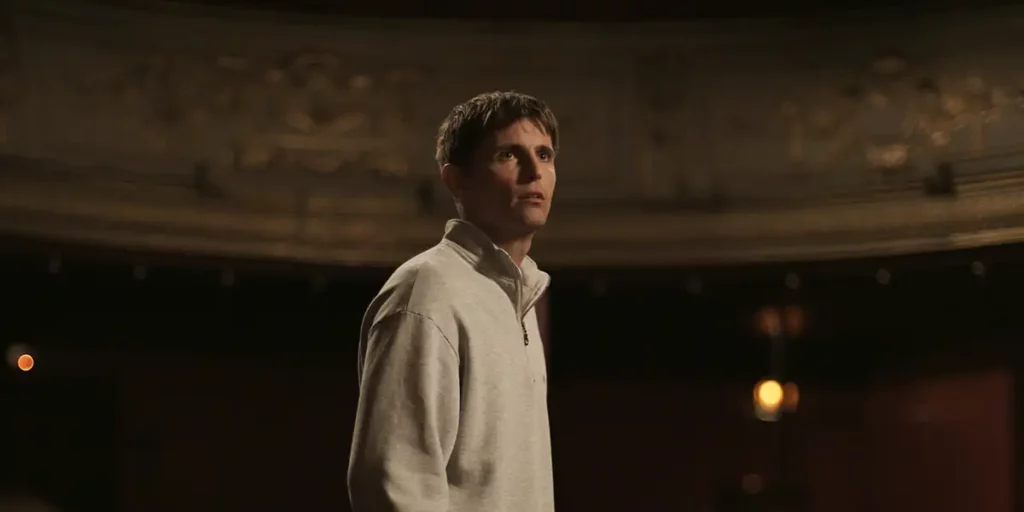With Yannick, Quentin Dupieux creates a satire that explores the modern cinemagoer’s relationship with the art form.
Nowadays, there aren’t many cinematic workhorses – filmmakers who can be relied upon to do a large amount of work – particularly those who don’t miss a beat with each project and reinvent themselves in the process. One of them is French filmmaker and electronic musician Quentin Dupieux, who has produced six films in the past six years – a figure that’s even more impressive considering that none of his movies feel or look the same as the ones that came before. His latest one, Yannick, is no different. With his usual minimalist approach yet a more sophisticated tone, Quentin Dupieux makes you laugh, feel uncomfortable, and ponder your relationship with the cinematic art form, delivering one of his most restrained yet provocative works.
There’s a play taking place at the beginning of Yannick. But not even fifteen minutes into the film, that play will shift into another project of itself. The name of the comic theatrical production is ‘Le Cocu’ (or ‘The Cuckold’ in English): Paul (Pio Marmaï, Happening) is struggling with the fact that his wife Madeleine (Blanche Gardin, France) is having a “platonic affair” with another man, William (Sébastien Chassagne). When the film begins, the three actors are performing to what seems to be a minimal crowd. Is it a special performance before a big show? Is it a showing for the cast and crew’s close friends and family? Or – the most unfortunate scenario of them all – it is a struggling play that hasn’t sold many tickets?
“Sorry to interrupt. I know it is not right”, says a man suddenly standing up from his seat and interrupting the play like he is breaking the fourth wall. His name is Yannick (Raphaël Quenard, All Your Faces); he is a car park attendant with a few troubling days. And this attention-grabbing antic of interrupting a play is his form of conveying his frustrations. Yannick mentions that watching this show has made his day feel worse than before, which is relatable since I have also watched many current releases and have thought the same thing (but I didn’t heckle or anything of the sort).
“You are adding to my problems, not making me forget mine”, Yannick states during his rant. This sparks a fiery discourse between the heckler and the actors, the latter telling him they can reimburse his money if he just lets them finish the play. So, he decides to leave the theater. But the sound of the audience clapping at his exit infuriates Yannick, causing him to return – this time, with a gun. He holds the audience and cast hostage and becomes a master of ceremonies for the rest of the afternoon. Yannick’s plan is to write a new play to cheer everyone up, and have the cast act it out.

As he attempts to “control the situation”, the man raises some thought-provoking questions. Through his annoyance, he speaks about this current generation’s relationship with art and the critic’s point of view. There’s a new play that lies in Yannick’s loss of control, resulting in his decision to hold an entire group of people hostage. In his usual metatextual and humorist way, Dupieux makes the viewer think about the films we see, and asks us if the people buying a ticket are being held hostage from the moment they sit down at the cinema. It is a strange, provocative interpolation, one that will raise many conversations amongst those who will eventually watch Yannick.
Quentin Dupieux has always had a knack for using unusual, sometimes absurd situations and creating something utterly original around them that somehow, in the weirdest way imaginable, comments on current topics. Last year, the French filmmaker touched on the current state of the superhero film-obsessed Hollywood machine with Smoking Causes Coughing. Here, he does the same thing, yet in a more restrained, less ridiculous manner. There are no killer tires or overgrown flies this time; the production itself is simplistic, with static shot compositions and the location mostly stripped of details and a decent color palette. Instead, there is a man with a gun who stands up from his seat to demand something else from the already written and rehearsed play.
Yannick paid a ticket for ‘Le Cocu’, yet he wants to barge in and change everything because it isn’t to his liking. This made me question the unhealthy relationship some people have with cinema – and I’m not referring to those cinephiles who have already watched over 200 movies three months into the year (which I still deem an unhealthy bond with the art form). Through the character of Yannick, Quentin Dupieux speaks about how spectatorship changed forever throughout the years. As audience members, we are meant to absorb what is seen on the screen; the ideas and theories presented by the filmmaker come with the purpose of analyzing them afterward. But in the grand scheme of things, that side of the spectatorship has been lost, with viewers growing more impatient and, just like Yannick with ‘Le Cocu’, wanting something the filmmaker isn’t providing.
Nowadays, regular theater-goers rarely engage with the films they watch. They prefer to complain about what they saw and how they would have wanted things to turn out in multiple social media posts. It is hilarious how Dupieux manages to personify this type of theater-attending audience. The banter between Yannick and the cast regarding art and the “critic’s eye” is similar to the repetitive, unnecessary discussions on Film Twitter, a cesspool of a platform filled with inarticulate takes on movies and taciturn comments on the themes they cover. It is an occasionally one-sided back-and-forth exchange that leads nowhere, showing a lack of appreciation for the art form and an “I would have done this…” mentality. Dupieux doesn’t hide that Yannick is meant to mock people similar to the titular character, with jabs thrown so quickly that they are easy to read yet properly orchestrated that they still manage to get them by surprise.
Not only is the satire enhanced by the cast’s razor-sharp line delivery, particularly Raphaël Quenard’s, who is becoming a French cinema star on the rise but also from multiple layers of irony that are slowly but indeed revealed throughout this film. When you think Dupieux has said his piece, he hits you with another astute on-the-nose line that is stronger and funnier than what preceded it. Yannick‘s final minutes are dedicated to the play that the titular character created. The public (and us watching at the cinema) laugh at it and are pretty entertained, even after being held hostage for quite a while. However, it is only funny within the context of Dupieux’s caustic lens. This is the French filmmaker’s theater now, where he directs what he wants, and anything – whether absurd or truthful – can happen.
Yannick will be available to watch on MUBI from April 5, 2024. Read our reviews of Quentin Dupieux’s films Daaaaaali!, Deerskin, Keep An Eye Out (Au Poste!), and Smoking Causes Coughing.

